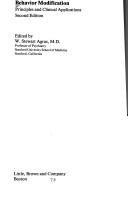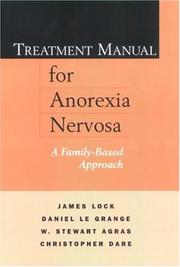| Listing 1 - 7 of 7 |
Sort by
|

ISBN: 0316020311 Year: 1978 Publisher: Boston (Mass.) : Little, Brown,
Abstract | Keywords | Export | Availability | Bookmark
 Loading...
Loading...Choose an application
- Reference Manager
- EndNote
- RefWorks (Direct export to RefWorks)
Book
Year: 1985 Publisher: Stanford (Calif.) : Stanford Alumni Association,
Abstract | Keywords | Export | Availability | Bookmark
 Loading...
Loading...Choose an application
- Reference Manager
- EndNote
- RefWorks (Direct export to RefWorks)
Fear. --- Phobias. --- Panic attacks. --- Anxiety. --- Behavior therapy.
Book
ISBN: 071671731X Year: 1985 Publisher: New York Freeman
Abstract | Keywords | Export | Availability | Bookmark
 Loading...
Loading...Choose an application
- Reference Manager
- EndNote
- RefWorks (Direct export to RefWorks)
Book
ISBN: 0190230444 1281342297 9786611342296 0199715173 9780199715176 0190450487 Year: 2008 Publisher: New York : Oxford University Press,
Abstract | Keywords | Export | Availability | Bookmark
 Loading...
Loading...Choose an application
- Reference Manager
- EndNote
- RefWorks (Direct export to RefWorks)
Cognitive-Behavioral Therapy (CBT) has been proven effective for treating Bulimia Nervosa and Binge Eating Disorder. However, this type of program requires at least 6 months of weekly sessions with a qualified mental health professional. If you suffer from an eating disorder and want to get treatment, but have little time to devote to therapy, a shorter, time-limited program may be right for you. This workbook outlines a Guided Self-Help (GSH) program based on the principles of CBT. Although sessions with a therapist or clinician are required, there are usually no more than 12 and each one is
Eating disorders --- Bulimia --- Compulsive eating. --- Binge eating --- Binging, Food --- Food binging --- Compulsive behavior --- Obesity --- Disorders of eating --- Eating, Pathological --- Eating disturbances --- Eating dysfunctions --- Pathological eating --- Appetite disorders --- Psychology, Pathological --- Patients --- Rehabilitation. --- Treatment. --- Psychological aspects
Book
ISBN: 9780190621001 9780190620998 0190620994 Year: 2017 Publisher: Oxford Oxford University Press
Abstract | Keywords | Export | Availability | Bookmark
 Loading...
Loading...Choose an application
- Reference Manager
- EndNote
- RefWorks (Direct export to RefWorks)
The second edition of this Handbook provides an updated overview of the field of eating disorders including phenomenology of the eating disorders; epidemiology; sociological, psychological, and biological research pertinent to etiology; clinical and research assessment of the eating disorders; and prevention and treatment. Several new chapters describe emerging topics. Each chapter is written by an expert in the area reviewed, and the Handbook is directed toward graduate students, psychologists, and psychiatrists with a particular interest in eating disorders. Approaches to understanding the eating disorders range from cultural factors impacting eating and body size to a current understanding of the regulation of appetite and its relation to disordered eating. Other chapters review the evidence for psychosocial risk factors for the eating disorders, the roles of emotions and of dieting, and the current state of genetic research. Clinical issues are equally well represented, particularly current research into evidence-based treatments such as cognitive-behavioral therapy, interpersonal psychotherapy, family therapy, and emotion-based treatments such as dialectical behavior therapy. Clinical themes such as the use of the Internet and mobile applications intended to broaden access to treatment are also taken up in the section on emerging topics. Although evidence for effectiveness is not yet well established, it is expected that such evidence will develop rapidly over the next few years. A chapter on selective or picky eating has also been added, because it is a common and troublesome problem for parents and the research base has much expanded since the first edition of the Handbook

ISBN: 1572308362 Year: 2001 Publisher: New York The Guilford Press
Abstract | Keywords | Export | Availability | Bookmark
 Loading...
Loading...Choose an application
- Reference Manager
- EndNote
- RefWorks (Direct export to RefWorks)
Book
ISBN: 0716710870 Year: 1979 Publisher: San Francisco (Calif.) Freeman
Abstract | Keywords | Export | Availability | Bookmark
 Loading...
Loading...Choose an application
- Reference Manager
- EndNote
- RefWorks (Direct export to RefWorks)
Behavior therapy --- Behavior Therapy --- Research
| Listing 1 - 7 of 7 |
Sort by
|

 Search
Search Feedback
Feedback About UniCat
About UniCat  Help
Help News
News